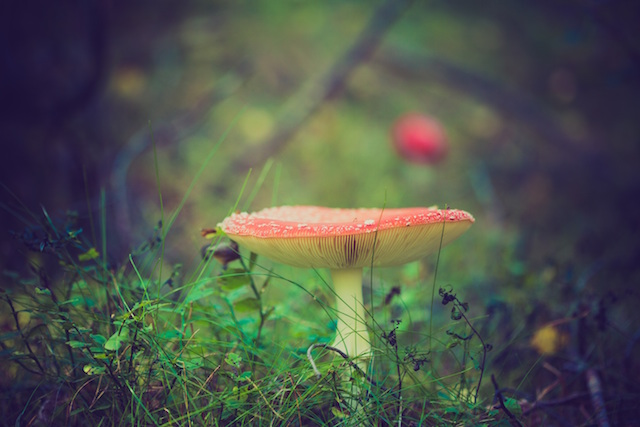Okay, so we’ve all at least heard of mushrooms, whether through a pizza topping or high quality health supplement, but what are medicinal mushrooms exactly?
How do they differ from the ones we toss in salads? What components give them the medicinal profile? And, lastly, what can they do for all of us?
These are important questions that deserve answers before we start adding medicinal mushrooms into our daily regime. Even if we already use them, a deeper explanation will not only further our understanding of these herbs, but also provide a look inside the interworking of the mushrooms themselves and the amazing tune-ups that await our bodies.
Mushrooms have been taken medicinally for 5,000 years or more, and from ancient civilizations to up-to-date experiments, it is conclusive that fungi have a collective healing power unlike any other naturally occurring element on our planet.
To Nature as is To Nurture.
What mushrooms do in nature is not unlike some of the effects they have within us when taken medicinally.
Fungi are known as the great recyclers. They feed themselves by breaking down organic matter into essential elements. There is a staggering estimate of over 1,500,000 species of mushrooms on our earth, and counting. There are countless undiscovered species, and just as many that we’ve discovered with little to no investigation. Of the well-researched mushrooms, about 700 are edible, and 50 are poisonous. Imagine the possibilities of the undiscovered mushrooms that could be beneficial to mankind!
With fungi making up about a quarter of the biomass on Earth, their purpose is to transform dead organic matter into nutrients that plants, animals and humans can feed on. Without mushrooms, our planet would be crowded with dead, rotting plants and animals, not to mention the new ones that would not have food or nutrients to feed on and, in turn, would not grow.
Then reflect on how this relates to the ecosystems within us. Just as certain cells, foods, pollutants, chemicals and other stressors stagnate the earth, our bodies undergo an exact replication, thus making medicinal mushrooms an essential key in keeping our systems healthy, clean and highly functional.
Culinary vs. Medicinal.
Most mushrooms are good for you. Culinary mushrooms are great sources of B-vitamins, iron, niacin, thiamine and ascorbic aid. Some are high in good fats, while others are high in carbohydrates and fiber. They are also great sources of protein, and contain essential amino acids.
Modern science began embracing the idea of medicinal mushrooms when it was discovered that in certain mushroom-growing regions, people seemed to be healthier than average. When a considerably lower cancer rate was discovered in certain mushroom-cultivating regions, further research revealed cancer-fighting components were present in the mushrooms. This is just one of countless examples that have entered mushrooms into modern-day medicine, but the truth is, certain mushrooms have been used for over 5,000 years as medicine.
Medicinal mushrooms are simply a class above culinary ones. This means that they have a higher concentration of nutrients; they are organically grown and sterilized before being made into supplement form, more easily digested and more easily utilized by our bodies. Of the many nutrients that make a mushroom medicinal, polysaccharides lead the immune-modulators and truly set medicinal mushrooms above their culinary cousins.
What Are Polysaccharides?
A polysaccharide is basically a long chain sugar molecule, which is unique for a couple of reasons. First, it is neutral or slightly bitter in taste due to its long chain chemical structure, unlike other sugars like fructose or sucrose, which are sweet to the taste, have a limited action in the body and have a short chain chemical structure. These polysaccharides are also unique because they plug into receptor sites on immune cells and act as a thinking cap to the immune system, helping it to do its job more effectively.
Most important to note, polysaccharides are not an immune stimulant or depressant, but rather immune regulating or balancing.
Medicinal mushrooms do not push the immune system one way or another like many other immune-influencing herbs. These herbs actually balance and modulate the immune system—or in the other words, assist the immune system where it needs assisting. So if there is an under-active area, medicinal mushrooms can bring it back up to balance. If there is an overactive area, they can actually calm that back down to balance. This indicates that these herbs are intelligent, and worthy of the title, “adaptogens,” because they not only help us adapt to stress, but they also intelligently and gently adapt to the current level of homeostasis in the body.
Intelligent action sets mushrooms apart from other forms of vegetation. One mushroom, Physarum Polycephalum, was able to navigate a maze with a food source at the other end. Medicinal mushrooms take similar action on seeking out imbalances and regulating within the maze that is our own bodies.
Medicinal Mushrooms and You.
Virus and bacteria are intelligent organisms, which are constantly evolving and changing. Keeping this in mind, it makes perfect sense to ingest things that can keep our immune system strong and balanced. We are constantly exposed to stressors and toxins in our environment that can have negative effects on our immune system and overall health. The daily experience of living can stress us out as well, and stress hormones like cortisol can have detrimental effects on the immune system.
Simply put, we are exposed to germs, sicknesses, pollutants, chemicals and countless stressors daily, and by consuming medicinal mushrooms we can usually expect:
- High protection from these stressors.
- More intelligent bodily functions.
- A free ride toward homeostasis.
- Enhanced immune system.
- Reduced stress and heightened mood.
- More energy.
- Healthier skin.
- Better digestion.
- Tonifying of all the organs.
- Resistance to aging and other depletion to our systems.
Some of the leading medicinal mushrooms with high levels of polysaccharides are Reishi, Chaga and Cordyceps. The polysaccharide content is greatly increased by consuming a concentrated extract, as this is the purest and most bioavailable.
There is no cure-all or magic mushroom that will make disease vanish or grant eternal life. They do, however, rally the immuno-troops that already exist in our bodies and assist in creating the strongest and most effective immune system that is rightfully ours. They uncover the natural and primitive means of thriving, connecting us to both the earth and the best version of ourselves.
~
Check out potent medicinal mushroom extracts here.
~
Author: Brandon Gilbert
Editor: Toby Israel
Image: Espen Willersrud/Unsplash
~







Read 24 comments and reply